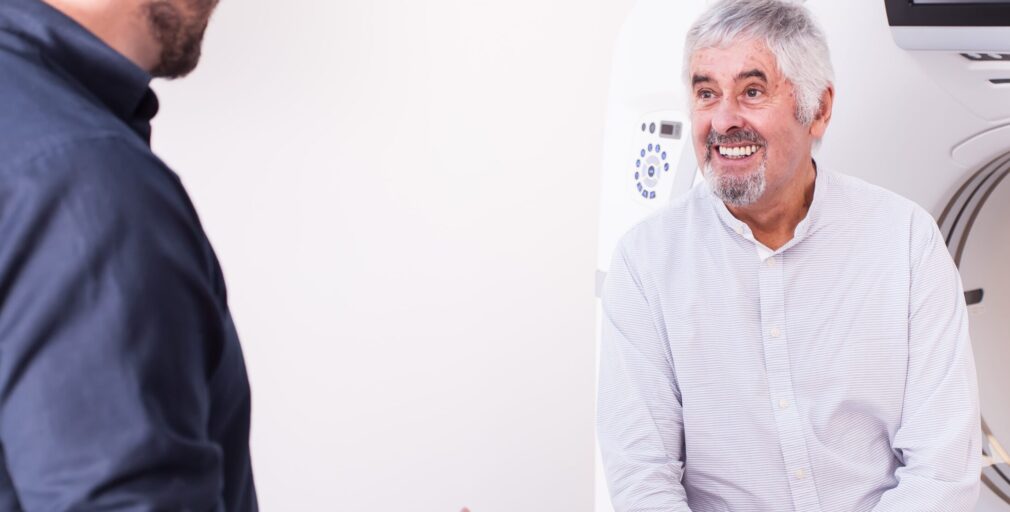Prostate Screening with MRI
Advances in MRI technology and clinical experience has now made it possible to screen for the most dangerous (high grade) prostate cancers which should receive urgent treatment. At the Chenies Mews Imaging Centre, we offer rapid direct access to quick and non-invasive MRI scans for patients who have normal a normal prostate specific antigen (PSA) blood test for their age range but wish to undergo health screening for their prostate health.

Why should we screen for prostate cancer?
Prostate cancer is extremely common in men over 50 years of age – indeed, most men in this group will have it at some point in their lives. For most patients, a diagnosis of prostate cancer is made using a combination of blood test (PSA), multi-parametric MRI, and tissue biopsy.
Despite prostate cancer being one of the most common types of cancer in males, it will cause harm in relatively few patients. The focus of a screening test is therefore not to detect all cancers, but to detect the dangerous ones – the ones that may present a risk to life and that should receive urgent treatment.
In collaboration with the London Uroradiology Partnership, we have to set up a new MRI test that can spot the most dangerous (or high grade) cancers but deliberately ‘miss’ most that are unlikely to cause harm. This means that many patients can avoid unnecessary treatment for low grade cancers which may cause unpleasant and life-altering side effects.
Is prostate screening similar to screening for cancer elsewhere in the body?
An increasing number of patients are taking greater responsibility for their own health and taking proactive steps in managing it. This often includes annual or bi-annual medical examinations which, depending on risk profile, may include sophisticated diagnostic tests of the lungs, heart and colon.
Prostate screening is a new form of screening test which is recommended for patients who do not have an abnormal prostate specific antigen (PSA) blood test for their age, but who may wish to take control of their prostate health.
Prostate cancer screening using MRI is a little different to screening elsewhere in the body. When screening the prostate using MRI, we expect to miss low grade cancers that are unlikely to cause any problems in life. Our aim is to detect only those cancers that are dangerous and would require treatment.
As in other screening programs, it is advisable to undergo prostate cancer screening every few years, rather than just once (the timing is for you and your doctor to decide).
What does prostate screening with MRI involve?
Prostate cancer screening may be suitable for you if you have
- had a recent PSA test which is in the normal range for a man of your age,
- you have had no serious previous prostate problems and
- you have no current symptoms that make your GP suspect you have prostate cancer.
A “bi-parametric” prostate screening scan lasts only 15-20 minutes. It is shorter (and cheaper) than a full multi-parametric scan (which would always be the preferred test if your GP or urologist suspect you might have a high grade prostate cancer).
MRI does not use any form of ionising radiation. A prostate screening scan also does not involve any intravenous injections of contrast dye. Therefore, the scan is considered very safe.
During your scan, you will need to lie very still. The MRI scanner will make various noises which can be loud (we will provide ear protection to avoid damaging your hearing). You may also feel some vibrations, but should not experience anything unpleasant or painful.
Once your scan is complete, your scan will be reported by a leading Consultant Uro-Radiologist within 48 hours. The report is then sent to your GP, who will provide you with a copy.
There are three possible outcomes and a traffic light system will be used for the report.
- Green: your prostate appears completely normal.
- Amber: there is cause for concern, but nothing obviously diagnosable as cancer. You should talk to your GP about possible next steps.
- Red: there is an obvious lesion, so your GP will refer you to a Urologist for further investigation.
Why can my GP not just use a PSA blood test to screen for prostate cancer?
A raised PSA level can be a sign of prostate cancer, but can also occur due to a non-cancerous enlargement or inflammation of the prostate. Many men have a raised PSA level without having cancer. Conversely, a substantial number of men with a low PSA level will subsequently be diagnosed with prostate cancer.
At least 30% of men who undergo MRI scans are found not to have prostate cancer and are discharged back to their GP.
How can I arrange a prostate screening MRI?
If you wish to undergo prostate screening with MRI as a part of a medical review, please speak to your GP and ask them to refer you directly to the Chenies Mews Imaging Centre for a ‘bi-parametric MRI prostate’ scan.
Your GP will need to have performed a PSA blood test for you within the previous 6 months. They will need to provide us with this result when they refer you.
Once your scan is complete, your report will be returned directly to your GP. You will remain under the care of your GP throughout this process.
How much is a prostate screening MRI?
The price of a prostate screening MRI scan is £575. This includes the scan itself, and the specialist report which will be sent to your GP in the first instance.
You should be aware that Private Medical Insurers do not pay for screening scans of the prostate. Therefore, prostate screening is only available to patients who are able to self-fund their scan.
If you have Private Medical Insurance, and you either need a multi-parametric scan or are referred to a Urologist, most private insurance plans will provide cover. However, we would always advise you to check with your provider.



